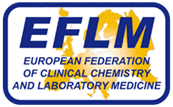9-11 November, 2016 – Leiden, Netherlands 
New_EFLM_Course_on_Test_Evaluation_in_Leiden
http://www.eflm-test-evaluation-course.eu/go/attend
Who should attend this course?
- Laboratory medicine professionals
- Clinicians and researchers involved in biomarker development and test evaluation
- Healthcare companies and regulatory representatives
Why should you attend this course?
Laboratory medicine has a poor record for bringing new tests to clinical care in a timely and effective way. There are numerous examples of tests which have been introduced to patient care but soon prove inadequate to meet clinical needs. Adding a further dimension to this problem are examples of tests that continue to be used despite their recognised deficiencies in clinical performance. In some cases such tests can cause patient harm. Another major challenge is the need to establish more effective researcher-laboratory-industry-clinician collaboration to develop new tests or biomarkers that can help address the ongoing unmet needs of clinicians. (See Commentary for further detail).
This situation is not unique to laboratory medicine, with all other areas of technology innovations facing similar challenges. However, it is now becoming especially serious and more urgent because of increasing financial constraints in healthcare which demand that we adopt more efficient processes including better test development and evaluation. Only those tests should be adopted which allow for effective clinical decision-making and allowing effective patient management.
Evidence based laboratory medicine (EBLM) provides the underlying principles for how a new biomarker should go through the test evaluation process but these principles alone do not appear to have guided better evaluation. This course aims to address that gap by applying the principles of EBLM to provide some practical tools which will help with key parts of test evaluation such as identifying unmet need, determining the analytical and clinical performance specifications that are required, and assessing clinical and cost effectiveness.
The course will bring together the key stakeholders in test development – clinicians, biomarker researchers, members of healthcare industry and laboratory medicine professionals. For the latter, the introduction of more efficient test development is seen as a core activity of the qualified clinical scientist of the future where they can take a place in the driving seat of this crucially important process.
Learning objectives
At the completion of this course, attendees should be able to:
- Describe the Test Evaluation framework including identification of the stages of biomarker evaluation in the context of current IVD/ISO regulatory requirements.
- Use a checklist to help guide a multi-stakeholder approach to identify unmet clinical need.
- Map an existing clinical pathway and then remap the position and role of tests in the modified clinical pathway.
- Define the clinical performance requirements for a new test based on the performance of existing tests in the current clinical pathway for the same indication
- Initiate an open dialogue about test evaluation including the putative benefits and the evidence requirements to justify the intended use in a target population.
- Have an appreciation of the different types of biomarker study design.
- Understand the inter-relationship between Analytical and Clinical Performance Specifications.
- Understand the importance of collaboration between all the stakeholders in test evaluation.
- Explain why reimbursement decisions are increasingly based on clinical effectiveness and outcomes.

